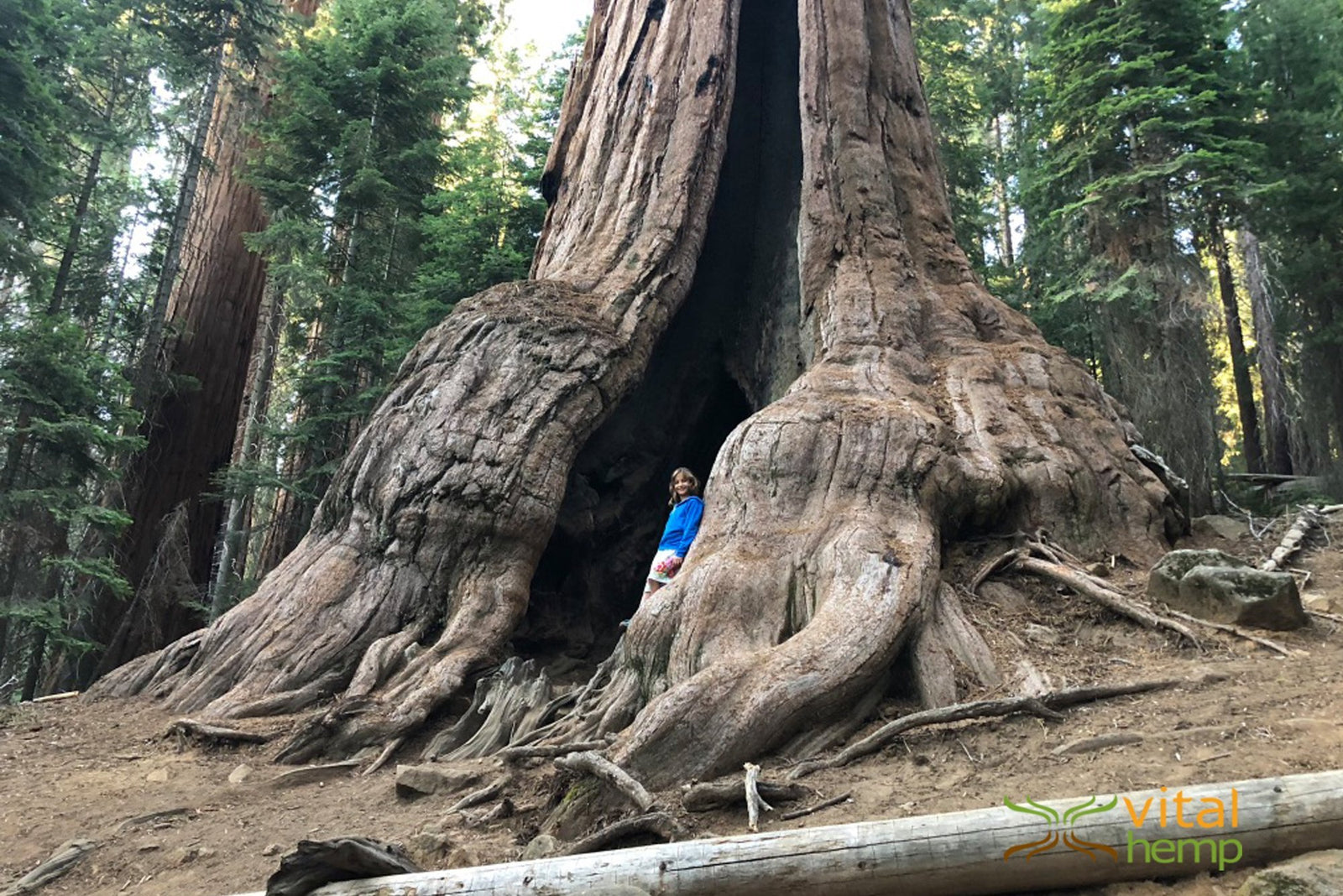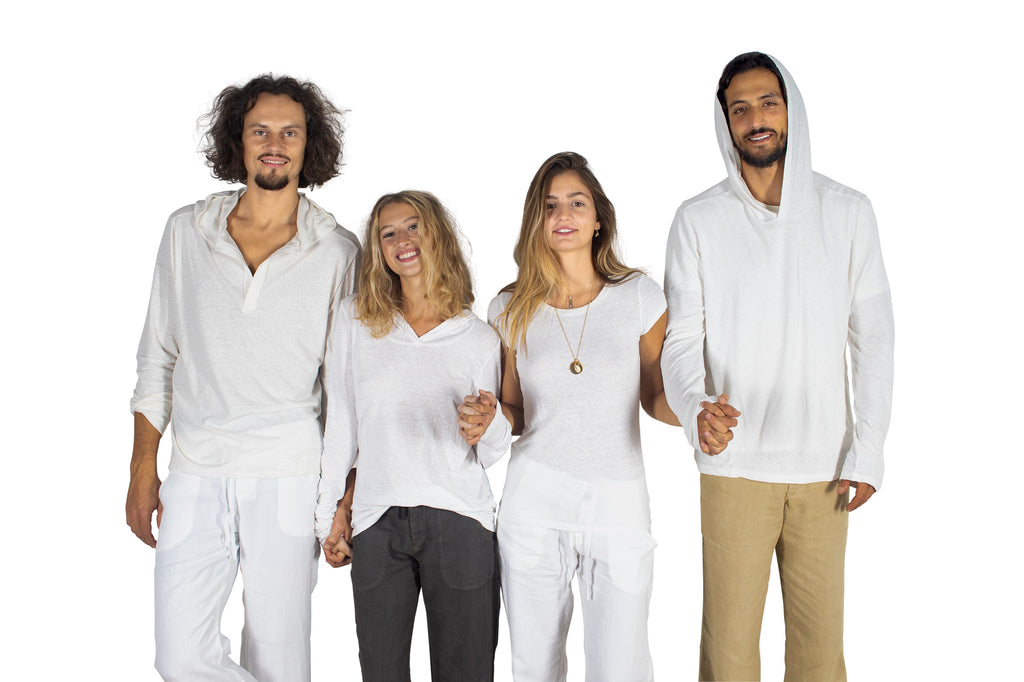
Vital Ones,
Since Vital Hemp's last newsletter, we’ve created some new styles and travelled to parts of our beautiful country for the first time. We even visited our first hemp-for-fiber field!!!
During this time, we also learned how the effects of global warming and deep ideological divides threaten not only our country’s well-being, but the health of people and the ecosystems that support us across the entire world. So much that we love and take for granted is worth saving! It’s time for us to come together to face the unifying challenge of our generation. One step: wear hemp.
 Hempers, hempretreneurs and merry hempsters in a hemp field in California.
Hempers, hempretreneurs and merry hempsters in a hemp field in California.
This morning, I read a few responses to yesterday’s front page story about how the giant sequoias are now threatened by the raging wildfires in California. I remember when I visited these trees with my daughter, back when she was still in the single digits, and the trees were still standing in their four-digit age.
It saddens me to tears that this news story will disappear after today, until perhaps the trees themselves burn, in drought-exacerbated Superfires that kill them, and even burn the seeds. Even then, what will we do to change the course of heating up the globe, destroying ecosystems and extinguishing species from the South Pole to the North, and across every mile of this unique, magnificent planet?

The results of what’s now considered a small fire in Oregon, that burned 90,000 acres in just over one month in 2003.
Will this news of the great Sequoias dying also pass, like news of the fires that ravaged the Amazon, Australia or Oregon? Will we move on to the next news story, the latest international, economic or cultural war? Or maybe just the latest catastrophe—be it fire, hurricane, flood, earthquake, tsunami, or tornado? How long can we pretend that the common underlying cause of these events—a rapidly warming globe--won’t affect us?
I started Vital Hemp on Earth Day, eighteen years ago, moved by a realization that the world needed more from me than I was providing as a lecturer in Film History. We are on Titanic Earth, speeding inexorably toward a melting iceberg that threatens to inundate our living world, warming oceans, massively altering climate, and descending us into an ice age so long and harsh that few specimens of life as we know it will survive. I didn’t want to be the guy in the auditorium on deck five, screening Run Lola Run, while we ran out of time to act.

It’s ok to acknowledge; it’s actually healthy to face the ways we’ve been spending time. I’ve been there too…for too many years. And I’ve lost my motivation to improve the world, many times…. How can I, when the problems are so enormous and daunting?
While we can learn a lot from the films of François Truffaut or Spike Lee, or even your favorite series on cable, I think it’s time we look away from the captivating screens long enough to let the sadness of our era sink in. We strive to pursue happiness, rarely realizing that a deeper happiness exists on the other end of a profound sadness. In the profoundest depths of that sadness, we often find ourselves and everything we love. We awaken to what’s worth nurturing or preserving, like our relationships, or our health, or even something so tasty and beautiful as your favorite summer fruit.
Recently, I again considered the idea that maybe the catastrophic scenarios playing out daily in the news aren’t the best means to motivate us to change our lives, to be in service of life on Earth. So Vital Hemp started a social media campaign on Facebook and Instagram, highlighting those people and things we love, that are threatened with extinction in just a few decades if we continue on this course, and that are worth saving—if not for ourselves, then for our descendants, or maybe for the other species on Earth, who also have every right to live.
It goes like this: “________ is (or are) worth saving.”
Fill in your own blanks. What’s worth saving for you?
Poets such as Wallace Stevens have written about how understanding that we will die gives shape and meaning to our lives. Our generation faces a more universal existential realization, and a more vital challenge: as we understand that all life (and everything we value and love) is facing a hot, soggy, decomposing death, how do we live to prolong a vital life for all, for future generations of every species we can name and the many we haven’t even discovered yet? How do we transform this mire of distractions into a clear pool of inspiration, from which we emerge with newfound resolve?

Unsurprisingly, the answers don’t materialize overnight. We might awaken with a new thought, a “can do” feeling of hope, and even do a few things that matter. And guess what? That’s enough. Because if everyone did just a few things that they know matter to address our collective challenge to cool the globe, we’d cool it! And our children’s children and their children’s children would be able to chill—not in sub-freezing temperatures, but in a world climate that continues to sustain all life.
The Chinese philosopher Lao Tzu wrote in the Tao Te Ching, “A journey of a thousand miles begins with a single step.” Years ago, a rabbi at a Yom Kippur service offered another metaphor for the cumulative effects of a single change, saying, “If you change your course by one degree, you’ll end up thousands of miles from your original destination.”
We know where we’re headed now. It’s not a pretty sight. Two UN reports (2019, and 2020) from the World Meteorological Association on The State of Global Climate document what’s happening to the climate on Earth, as well as “impacts on socio-economic development, migration and displacement, food security and land and marine ecosystems.”
These reports highlight what nations, businesses, cities and individuals can do to cut emissions, transition to renewable sources of energy, and act in ways that mitigate the worst impacts of global warming, while“prioritizing nature-based solutions, or locally appropriate actions offering benefits to people and nature.” Turns out that when individuals make choices that consider the impact on climate—from whom we elect to represent us, to what we eat, drive, and even what we wear--the cumulative effect of these individual changes add up, both in our own lives and in the life of a healthy world.
It’s time to become more mindful about these choices. The commons are suffering; and even oligarchs on their billion-dollar yachts cannot insulate themselves forever from a climate-ravaged Earth. Plus, don’t they want their kids to breathe clean air? To live and go to school, or play without the need for artificial bubbles? Don’t they want to visit the giant, ancient trees of California? Or even the forests in their own countries--also at risk, as we see fires engulfing forests in Alaska and Siberia alike? While it’s true that the uber-wealthy may insulate themselves from the worst ravages of a dying planet, they cannot do so forever. Wouldn’t it be better to lead by example, forging a healthier future we can all share?

To live life meaningfully, let’s look at what we love, and acknowledge that we are on the cusp of losing it—every bit of it. Feel that sadness? Good. Those things are worth preserving. The trees, the fruit, the favorite dish your grandmother made, the music that animated your youth, the movies you loved, the sports and hobbies and places you love, our animal friends, and the ones who live, indifferent to our existence, and yet impacted by it all.
So many things divide us. Let’s focus on the things upon which we can agree. Even climate change deniers are coming round to the idea that global warming is a problem. When one half the country is burning, and the other half is under water, everyone is affected, or knows someone who is…. New Yorkers are breathing smoke from the fires in the West.
Every year it will get worse. Whether we agree upon wearing masks or not, or upon mandates for injections or not, can we agree upon the reality that life is no longer normal? And that we have little chance of going back to anything like a healthy life in the long run if we do not address the melting iceberg in front of us, that threatens all life?
While we continue to suffer the consequences of our antiquated, hyper-consumptive systems, the future is still unwritten. We don't have to keep boiling the spaghetti, destroying the last fibers of life. Turns out that when individuals make choices that consider the impact on climate—from whom we choose to represent us, to what we drive, eat, and even what we wear--the cumulative effect of these individual changes add up, both in our own lives and in the life of a healthy Earth.
So let’s address it. Let’s face it. Let’s take that step. Let’s turn one degree. Or one-and-a-half…that’s all we need. It can start with a veggie sandwich, or a shorter shower, or even a hemp t-shirt.☺
Thanks for being vital,
Ron
Ron Alcalay
Founder/CEO/Hemperdasher
ron@vitalhemp.com
vitalhemp.com
~Let Us Hemp You Out!~
Coming soon in five colors: New Hemp Hoodie - Henley Style!
